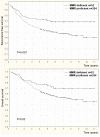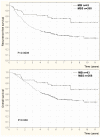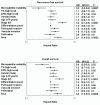Microsatellite instability in colorectal cancer and association with thymidylate synthase and dihydropyrimidine dehydrogenase expression
- PMID: 19154585
- PMCID: PMC2647942
- DOI: 10.1186/1471-2407-9-25
Microsatellite instability in colorectal cancer and association with thymidylate synthase and dihydropyrimidine dehydrogenase expression
Abstract
Background: Microsatellite instability (MSI) refers to mutations in short motifs of tandemly repeated nucleotides resulting from replication errors and deficient mismatch repair (MMR). Colorectal cancer with MSI has characteristic biology and chemosensitivity, however the molecular basis remains unclarified. The association of MSI and MMR status with outcome and with thymidylate synthase (TS) and dihydropyrimidine dehydrogenase (DPD) expression in colorectal cancer were evaluated.
Methods: MSI in five reference loci, MMR enzymes (hMSH2, hMSH6, hMLH1 and hPMS2), thymidylate synthase (TS) and dihydropyrimidine dehydrogenase (DPD) expression were assessed in paraffin embedded tumor specimens, and associated with outcome in 340 consecutive patients completely resected for colorectal cancer stages II-IV and subsequently receiving adjuvant 5-fluorouracil therapy.
Results: MSI was found in 43 (13.8%) tumors. Absence of repair protein expression was assessed in 52 (17.0%) tumors, which had primarily lost hMLH1 in 39 (12.7%), hMSH2 in 5 (1.6%), and hMSH6 in 8 (2.6%) tumors. In multivariate analysis MSI (instable) compared to MSS (stable) tumors were significantly associated with lower risk of recurrence (hazard ratio (HR) = 0.3; 95% CI: 0.2-0.7; P = 0.0007) and death (HR = 0.4; 95% CI: 0.2-0.9; P = 0.02) independently of the TS and DPD expressions. A direct relationship between MSI and TS intensity (P = 0.001) was found, while there was no significant association with DPD intensity (P = 0.1).
Conclusion: The favourable outcome of MSI colorectal carcinomas is ascribed mainly to the tumor biology and to a lesser extent to antitumor response to 5-fluorouracil therapy. There is no evidence that differential TS or DPD expression may account for these outcome characteristics.
Figures



References
-
- Greenlee RT, Hill-Harmon MB, Murray T, Thun M. Cancer statistics, 2001. CA Cancer J Clin. 2001;51:15–36. - PubMed
-
- Ribic CM, Sargent DJ, Moore MJ, Thibodeau SN, French AJ, Goldberg RM, Hamilton SR, Laurent-Puig P, Gryfe R, Shepherd LE, Tu D, Redston M, Gallinger S. Tumor microsatellite-instability status as a predictor of benefit from fluorouracil-based adjuvant chemotherapy for colon cancer. N Engl J Med. 2003;349:247–257. doi: 10.1056/NEJMoa022289. - DOI - PMC - PubMed
-
- Kim GP, Colangelo LH, Wieand HS, Paik S, Kirsch IR, Wolmark N, Allegra CJ. Prognostic and predictive roles of high-degree microsatellite instability in colon cancer: a National Cancer Institute-National Surgical Adjuvant Breast and Bowel Project Collaborative Study. J Clin Oncol. 2007;25:767–772. doi: 10.1200/JCO.2006.05.8172. - DOI - PubMed
Publication types
MeSH terms
Substances
LinkOut - more resources
Full Text Sources
Medical

